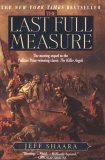Summary | Excerpt | Reviews | Readalikes | Genres & Themes | Author Bio

Critics' Opinion:
Readers' Opinion:
First Published:
Jun 1998, 560 pages
Paperback:
May 1999, 560 pages
In the South, Jefferson Davis maintains an iron hand, controlling even the smallest details of governing the Confederacy. It is not an effective system, and as in the North, men of political influence are awarded positions of great authority, men who have no business leading soldiers into combat. In mid-1862, through an act of fate, or as he would interpret it, an act of God, Robert Edward Lee is given command of the Army of Northern Virginia. What follows in the East is a clear pattern, a series of great and bloody fights in which the South prevails and the North is beaten back. If the pattern continues, the war will end and the Confederacy will triumph. Many of the fights are won by Lee, or by his generals--the Shenandoah Valley, Second Manassas. Many of the fights are simply lost by the blunders of Federal commanders, the most horrifying example at Fredericksburg. Most, like the catastrophic Federal defeat at Chancellorsville or the tactical stalemate at Antietam, are a combination of both.
By 1863 two monumental events provide an insight into what lies ahead. The first is the success of the Federal blockade of southern seaports, which prevents the South from receiving critical supplies from allies abroad, and also prevents the export of raw materials, notably cotton and tobacco, which provide the currency necessary to pay for the war effort. The result is understood on both sides. Without outside help, the Confederacy will slowly starve.
The second is the great bloody fight at Gettysburg. While a tragic defeat for Lee's army, there is a greater significance to the way that defeat occurs. Until now, the war has been fought mostly from the old traditions, the Napoleonic method, the massed frontal assault against fortified positions. It has been apparent from the beginning of the war that the new weaponry has made such attacks dangerous and costly, but old ways die slowly, and commanders on both sides have been reluctant to change. After Gettysburg, the changes become a matter of survival. If the commanders do not yet understand, the men in the field do, and the use of the shovels becomes as important as the use of muskets. The new methods--strong fortifications, trench warfare--are clear signs to all that the war has changed, that there will be no quick and decisive fight to end all fights.
As the Civil War enters its third year, the bloody reports continue to fill the newspapers, and the bodies of young men continue to fill the cemeteries. To the eager patriots, the idealists and adventurers who joined the fight at the beginning, there is a new reality, in which honor and glory are becoming hollow words. The great causes are slowly pushed aside, and men now fight with the grim determination to take this fight to its end; after so much destruction and horrible loss, the senses are dulled, the unspeakable sights no longer shock. All the energy is forward, toward those men across that deadly space who have simply become the enemy.
Robert Edward Lee
Born in 1807, he graduates West Point in 1829, second in his class. Though he is the son of "Light-Horse" Harry Lee, a great hero of the American Revolution, late in his father's life Lee must endure the burden of his father's business and personal failures more than the aura of heroism. Lee is devoutly religious, believing with absolute clarity that the events of his life are determined by the will of God. On his return from West Point, his mother dies in his arms. The haunting sadness of her death stays hard inside him for the rest of his life, and places him more firmly than ever into the hands of his God.
He marries the aristocratic Mary Anne Randolph Custis, whose father is the grandson of Martha Washington, and whose home is the grand mansion of Arlington, overlooking the Potomac River. The Lees have seven children, and Lee suffers the guilt of a career that rarely brings him home to watch his children grow, a source of great regret for him, and simmering bitterness in his wife Mary.
Copyright© 1998 by Jeffrey M. Shaara. All Rights Reserved.





The Flower Sisters
by Michelle Collins Anderson
From the new Fannie Flagg of the Ozarks, a richly-woven story of family, forgiveness, and reinvention.

The House on Biscayne Bay
by Chanel Cleeton
As death stalks a gothic mansion in Miami, the lives of two women intertwine as the past and present collide.

The Funeral Cryer by Wenyan Lu
Debut novelist Wenyan Lu brings us this witty yet profound story about one woman's midlife reawakening in contemporary rural China.
Your guide toexceptional books
BookBrowse seeks out and recommends the best in contemporary fiction and nonfiction—books that not only engage and entertain but also deepen our understanding of ourselves and the world around us.